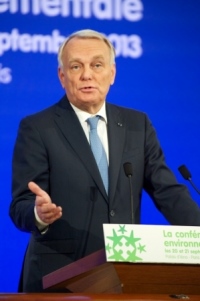Nuclear to fund French energy transition
23 September 2013
Revenue earned by France's existing nuclear power plants will be earmarked to fund the country's move to an energy mix featuring more renewables, Prime Minister Jean-Marc Ayrault has said.
 |
| PM Ayrault concludes the conference (Image: Benoit Granier/Matignon) |
Over the past 12 months France has been drawing up the plans for its so-called energy transition through a national debate, with over 170,000 people taking part in regional debates and 1200 submissions over the Internet. At a national environmental conference to mark the conclusion of the public debate, Ayrault praised the discussion for dealing freely "for the first time" with all aspects of French energy policy. "No topic, including nuclear and shale gas, has been evaded," he said.
Alongside ambitious plans to reduce energy consumption, the energy transition will see changes to France's energy mix, which since the 1970s has been firmly based on a high contribution from nuclear power. Launching the two-day conference, French president Francois Hollande pre-empted the new law by reiterating his 2012 election pledge to see nuclear's share of French generation capped at 50% by 2025, and the closure of France's oldest nuclear power plant, Fessenheim, by the end of 2016.
Speaking at the end of the conference, Ayrault noted that setting a course for 50% nuclear - down from current levels of over 75% - would mean that France would need to significantly expand its renewables. France is currently spending €4.0 billion ($5.4 billion) per year to fund renewable energy developments and €1 billion ($1.3 billion) on energy efficiency measures, he noted. This is to be augmented by a new tax on fuel consumption, expected to amount to €1 billion per year by 2016, plus an unspecified contribution from the earnings of France's nuclear power plants.
The tax on fuel consumption, referred to as the "climate contribution", will affect petrol, diesel, coal, oil, gas and heavy fuel, and is due to be adopted under the 2014 energy and finance act later this week.
Ayrault's speech did not elaborate in detail on how nuclear would contribute further than promising to "mobilise financial gains" from existing plants while ensuring maximum safety and continued supply. All such funds would be subject to state governance under the energy transition law, he said.
With the conclusion of the debate phase, ecology, sustainable development and energy minister Philippe Martin has been charged with drawing up a law enshrining the energy transition, to be presented in the spring of 2014 and voted on by the end of that year.
Researched and written
by World Nuclear News